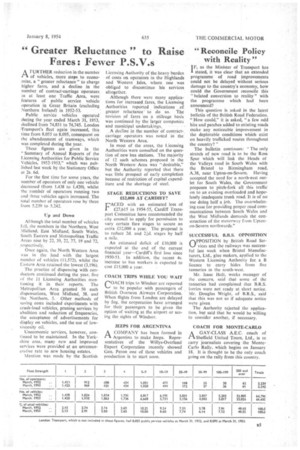"Greater Reluctance" to Raise Fares: Fewer P.S.V.s
Page 39

If you've noticed an error in this article please click here to report it so we can fix it.
A FURTHER reduction in the number rt of vehicles, more steps to economize, a "greater reluctance" to charge higher fares, and a decline in the number of contract-carriage operators in at least one Traffic Area, were features of public service vehicle operation in Great Britain (excluding Northern Ireland) in 1952-53.
Public service vehicles operated durjng the year ended March 31, 1953, declined from 74,851 to 74,745. London -Transport's fleet again increased, this time from 8,055 to 8,095, consequent on the abandonment of tramways, which was completed during the year.
These figures are given in the " Summary of Annual Reports of the Licensing Authorities for Public Service Vehicles, 1952-1953," which was published last week by the Stationery Office at 2s. 6d.
For the first time for some years, the number of operators of only one vehicle decreased (from 1,438 to 1,420), whilst the number of operators running two and three vehicles again increased. The total number of operators rose by three from 5,239 to 5242.
Although the total number of vehicles fell, the numbers in the Northern, West Midland, East Midland, South Wales, South Eastern and Metropolitan Traffic Areas rose by 22, 39, 22, 77, 19 and 72, respectively.
Once again; the North Western Area was in the lead with the largest number of vehicles (11,572), whilst the Eastern Area retained the lowest (3,196).
The practice of dispensing with conductors continued during the year, five of the 11 Licensing Authorities mentioning it in their reports. The Metropolitan Area granted 50 such dispensations, West Midland, 38, and the Northern, 5. Other methods of saving costs included experiments with crush-load vehicles, pruning services by abolition and reduction of frequencies, the acceptance of advertisements for display on vehicles, and the use of lowviscosity oil.
Uneconomic services, however, continued to be maintained. In the Yorkshire area, many new and improved services were provided at an unremuncrative rate to new housing estates.
Mention was made by the Scottish Licensing Authority of the heavy burden of costs on operators in the Highlands and Western Isles, where one was obliged to discontinue his services altogether.
Although there were many applications for increased .fares, the Licensing Authorities reported . indications of greater reluctance to do so. The revision of fares on a Mileage basis was continued by the larger companies and municipal undertakings.. • . A decline in the number of contract carriage operators was noted in the North Western Area.
In most of the areas, the Licensing Authorities were consulted on the question of new bus stations. The majority of 12 such schemes proposed in the North Western Area was "desirable," but the Authority reported that there was little prospect of early completion because of restriction of capital expenditure and the shortage of steel.
STAGE REDUCTIONS TO SAVE 152,000 AT CARDIFF?
EACED with an estimated loss of £27,615 in 1954-55, Cardiff Transport Committee have recommended the city council to apply for permission to vary certain fare stages to secure an extra £52,000 a year. The proposal is to reduce 2d. and 21d_ stages by half a mile.
An estimated deficit of £10,000 is expected at the end of the current financial year-Cardiff's first loss since 1950-51. In addition, the recent 4s. increase to bus workers is expected to cost £15,000 a year. • COACH TRIPS WHILE YOU WAIT
rOACH trips to Windsor are reported
to he popular with passengers of British Overseas Airways Corporation. When flights from London are delayed by fog, the corporation have arranged for their passengers to be given the option of waiting at the airport or seeing the sights of Windsor.
JEEPS FOR ARGENTINA
A COMPANY has been formed in iTh Argentina to make Jeeps. Representatives of the Willys-Overland Export Corporation recently showed Gen. Peron one of these vehicles and production is to start soon.




































































































